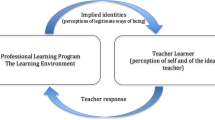Abstract
This article deals with issues that are central to changed mathematics pedagogical practice. It engages general debates about teaching reflexivity and within that, more specific debates in relation to identity. It uses theoretical concepts derived from Lacanian psychoanalysis as a way of understanding what structures a teacher’s narrative about his practice. Thus, the article is both a study of one teacher’s reflections on a sequence of algebra lessons at the secondary school level, and an exploration into a range of theoretical issues about identity construction, about knowing, and about effective practice.
Similar content being viewed by others
References
Anthony, G., & Walshaw, M. (2007). Effective pedagogy in Mathematics/Pāngarau: Best Evidence Synthesis Iteration [BES]. Wellington: Learning Media.
Beck, U. (1992). Risk society: Towards a new modernity. London: Sage.
Boston, M., & Smith, M. (2009). Transforming secondary mathematics teaching: Increasing the cognitive demands of instructional tasks used in teachers’ classrooms. Journal for Research in Mathematics Education, 40(2), 119–156.
Brown, T. (2008). Lacan, subjectivity and the task of mathematics education research. Educational Studies in Mathematics, 68, 227–245.
Brown, T., & England, J. (2004). Revisiting emancipatory teacher research: A psychoanalytic perspective. British Journal of Sociology of Education, 25(1), 67–79.
Brown, T., & England, J. (2005). Identity, narrative and practitioner research: A Lacanian perspective. Discourse Studies in the Cultural Politics of Education, 26(4), 443–458.
Brown, T., & McNamara, O. (2005). New teacher identity and regulative government: The discursive formation of primary mathematics teacher education. New York: Springer.
Butler, J. (2004). Undoing gender. New York: Routledge.
Carr, W., & Kemmis, S. (1986). Becoming critical. London: Falmer Press.
Cotton, T. (2010). Diamonds in a skull: Unpacking pedagogy with beginning teachers. In M. Walshaw (Ed.), Unpacking pedagogy: New perspectives for mathematics classrooms (pp. 43–63). Charlotte, NC: Information Age.
Elliott, J. (1987). Educational theory, practical philosophy and action research. British Journal of Educational Studies, 35, 149–169.
Ferrini-Mundy, J., Burrill, G., & Schmidt, W. (2007). Building teacher capacity for implementing curricular coherence: Mathematics teacher professional development tasks. Journal of Mathematics Teacher Education, 10, 311–324.
Hanley, U. (2007). Fantasies of teaching: Handling paradoxes inherent in models of practice. British Education Research Journal, 33(2), 253–272.
Lacan, J. (1977). The four fundamental concepts of psycho-analysis. London: The Hogarth Press.
Lewis, C., Perry, R., & Hurd, J. (2009). Improving mathematics instruction through lesson study: A theoretical model and North American case. Journal of Mathematics Teacher Education, 12(4), 285–304.
Muir, T., & Beswick, K. (2007). Stimulating reflection on practice: Using the supportive classroom reflection process. Mathematics Teacher Education and Development, 8, 94–116.
Nolan, K. (2007). How should I know? Preservice teachers’ images of knowing (by heart) in mathematics and science. Rotterdam: Sense Publishers.
Norton, A., & McCloskey, A. (2008). Teaching experiments and professional development. Journal of Mathematics Teacher Education, 11, 285–305.
Peng, A. (2007). Knowledge growth of mathematics teachers during professional activity based in the task of lesson explaining. Journal of Mathematics Teacher Education, 10, 289–299.
Pitt, A., & Britzman, D. (2003). Speculations on qualities of difficult knowledge in teaching and learning: An experiment in psychoanalytic research. Qualitative Studies in Education, 16(6), 755–776.
Thomson, R., Henderson, S., & Holland, J. (2003). Making the most of what you’ve got? Resources, values and inequalities in young women’s transitions to adulthood. Educational Review, 55, 33–46.
Walkerdine, V. (2003). Reclassifying upward mobility: Femininity and the neo-liberal subject. Gender and Education, 15(3), 237–248.
Walkerdine, V., Lucey, H., & Melody, J. (2003). Subjectivity and qualitative method. In T. May (Ed.), Qualitative research in action (pp. 179–196). London: SAGE.
Wallach, T., & Even, R. (2005). Hearing students: The complexity of understanding what they are saying, showing and doing. Journal of Mathematics Teacher Education, 8, 393–417.
Walshaw, M. (2004a). The pedagogical relation in postmodern times: Learning with Lacan. In M. Walshaw (Ed.), Mathematics education within the postmodern (pp. 121–139). Greenwich: Information Age.
Walshaw, M. (2004b). Pre-service teaching in the context of schools: An exploration into the constitution of identity. Journal of Mathematics Teacher Education, 7(1), 63–86.
Zeichner, K. M. (1993). Action research: Personal renewal and social reconstruction. Educational Action Research, 1(2), 199–219.
Žižek, S. (1989). The sublime object of ideology. London: Verso.
Žižek, S. (Ed.). (1998). Cogito and the unconscious. Durham: Duke University Press.
Acknowledgments
Members of the LPS research team also include Glenda Anthony (co-director), Tim Burgess, Liping Ding, Anne Lawrence and Peter Rawlins. The author would like to acknowledge their valuable contributions in the project. The views expressed in this article are those of the author and do not necessarily represent those of the other members of the project team.
Author information
Authors and Affiliations
Corresponding author
Rights and permissions
About this article
Cite this article
Walshaw, M. Mathematics pedagogical change: rethinking identity and reflective practice. J Math Teacher Educ 13, 487–497 (2010). https://doi.org/10.1007/s10857-010-9163-7
Published:
Issue Date:
DOI: https://doi.org/10.1007/s10857-010-9163-7




